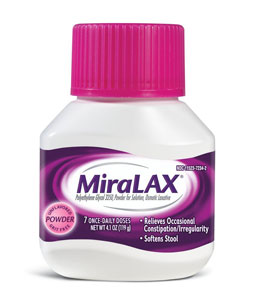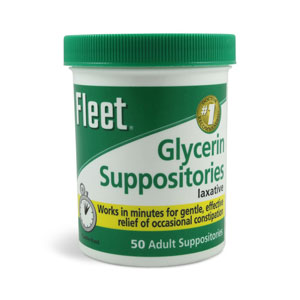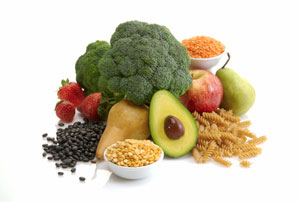Everything You Always Wanted to Know About Constipation on Dialysis, But Were Afraid to Ask
Lynda N. Newman MSN, RN, ACNS-BC, NP-C, CNN
What is Constipation?
Though it can mean different things to different people, constipation does have a definition. The Rome Foundation, a non-profit group that studies such things ("Rome III," 2012) defines it as:
Two or more of these symptoms in the past 3 months1

- Having bowel movements less than 3 times per week
- Having the following occur at least one fourth (25%) of the time:
- Straining with stool
- Lumpy or hard stool
- Feeling of incomplete emptying of the bowel
- Feeling of ano-rectal blockage (something is blocked "down there")
- Need for manual maneuvers (digging stool out with fingers).
- Loose stools only happen when laxatives are used
Why am I almost always constipated?

In the general public, people get constipated for many reasons. The most common one is not taking the time to go to the bathroom when they get the urge. Next is not eating right, not drinking enough fluids or not getting enough exercise.
If you have kidney failure, and I assume that you do since you are reading this, you have even more reasons to be constipated. If you have a potassium limit, you may not be able to eat the fruits and vegetables that can help give you an easy bowel movement. If you have a fluid limit, your body will find it harder to make a soft, wet stool that is easy to pass.
But, you might say, I am on peritoneal dialysis (PD)! I eat lots of fruits and veggies, drink 1.5 to 2 quarts of fluid per day, and am still constipated! Well, you still may take phosphate binders and you have 2+ liters of fluid pushing on your bowels. On PD, the problem may be about more than just the discomfort of feeling backed up. Constipation can slow or stop the drainage of your PD fluid by moving the tip of your catheter away from where the fluid is pooled.
With PD or hemodialysis (HD), this all gets worse if the urge to go strikes when you are on a machine. If you ignore an urge, it may go away. But, then the stool will sit in your rectum getting dryer and harder to pass. Add to all of this your binders and iron pills, and it becomes a surprise if you are not constipated!
Alert: You may start having loose or watery stools after a few days of hardly moving your bowels at all. This does not mean that you are having diarrhea. It may mean you are so plugged up that you are pushing loose or watery stools around a blockage. You can try the steps listed under severe constipation. If they do not work for you, or if you start to have belly pain, you may need to call your doctor or head for the emergency room.
How do I stop being constipated?
The goal is to have a heavy, wet stool that is easy to pass and gives you lots of notice that "it is time to go!" Then, you have to take the time to go when you get the urge. After a meal is often the best time, since your gut is already "on the move" to digest what you just ate. Choose the meal after which you can usually take the time. Go into the bathroom and sit for at least 10 minutes after that meal each day. This will help teach your body to have that urge at a time that works for you. In a perfect world your excellent diet will give you all you need to create that heavy, wet easy to pass stool. But since we do not live in a perfect world, sometimes we need a little help.
What can I take for constipation?
There are a lot of products in the digestive health aisle of the drug store. It helps to understand what they do so you can make good choices about what to use when. Of course, always check with your care team before you take any new product, even an over the counter one. Here are some of the types of products you might see:
- Stool Softeners: Stool softeners like docusate sodium (Colace™) are not laxatives. They make stools softer and easier to pass by pulling more water into them. You can take up to two of these twice (2 times) a day to help keep stools soft. Back off on the dosage if your stools get too soft.
-
Fiber products: These are bowel regulators. They work by adding wet bulk to stool. You can take these daily or twice a day to give yourself roughage. There are two kinds of fiber products:
- Psyllium, like Metamucil™ which is wheat based
- Methylcellulose like Citrucel™ which is plant based.

The best way to take these is mixing them into a glass (8 oz) of water or juice. Then follow it right away with a second glass (6-8 oz) of water or juice. You do not need to count this fluid in your daily limit. The fiber will absorb the fluid to form a gel that will give you that heavy wet stool. Be sure to wash the glass well right away, because that gel will stick to it! Fiber products promote regular bowel movements and can be taken daily. If your stools get too loose, just back off on the second glass of fluid, and the fiber will absorb more fluid from your gut. Always take fiber products with at least 8 oz of fluid. Taking them with too little fluid can cause a blockage in your gut.
You can, of course, get fiber by eating high fiber cereals, or a mixture of yogurt or applesauce and granola. Sadly, the effect may be ruined by the binders you may need to take with most cereal fibers. Taking in more fiber with foods or fiber products can cause gas and bloating at first. The problem tends to go away with routine use.
- Probiotics: These are the healthy bacteria that live in your gut. They keep bad bacteria away and help you digest food. Antibiotics can kill them off along with bad bacteria. You can help replace good bacteria by eating yogurt with a "Live and Active Cultures" label (take binders if you use them). Other fermented foods, like kefir, miso, tempeh, pickled foods (watch the salt!) or sauerkraut can also help. Or, take a daily supplement like Align™ or Culturelle™.
- If stool softeners and fiber and probiotics do not get you going, you may need a laxative once in a while. Here are four types of laxatives and how they work:
-
Osmotic agents: These pull fluid into your gut. There are two types. Polyols like Sorbitol or Lactulose are sweet syrups. Like fiber, they may cause gas and bloating at first start—this often gets better with time. The others are Salt based, like Milk of Magnesia® and polyethylene glycol (PEG, such as Miralax™). Milk of magnesia may be the cheapest, but it is not a safe choice with kidney failure. The safest and most effective will be PEG. Some prescription plans will cover it—or look for the cheaper drug store version. Many people find that it helps to take PEG or Sorbitol on any day they do not have a good bowel movement. These should get you moving by the next day.

- Stimulants: These act on the bowels to stimulate movements. They are okay to use once in a while. If you use them too often, you might find that you cannot move your bowels without them. Some stimulants you may have heard of are bisacodyl (Dulcolax TM) and Senna. Stimulants tend to work overnight.
-
Suppositories: Glycerin suppositories can be a good choice to restore a "missed urge". They provide lubrication. The act of inserting them gives you some local stimulation that can get you that urge back. You should get results in 15 minutes to 1 hour. Bisacodyl suppositories (Dulcolax™) give the same lubrication plus a stimulant. Use this when you feel like you have a lot of stool sitting "down there" but need help to get it out. You will hear from it in 15 to 30 minutes and maybe for a while afterward. Like the oral form, this is not for daily use. Your bowels can get dependent on it.

- The BIG gun: PEG with electrolytes (Golytely™ or Colyte™) is Miralax PLUS! This is used for colonoscopy test preps. The electrolytes keep you from getting dehydrated when you need a total clean out. This is prescribed for severe constipation (4-7 days with no stool). Since you don't need your bowels to "run clear", you would need less than the test prep amount. It is enough to get the bowels moving to the point of "mush". You can get the same effect by taking Miralax™ one capful in 6-8 oz of fluid every hour or so until things start moving. Generally four times will do it.
-
Eat as many fruits and vegetables as your diet allows. Make lower potassium choices if you have limits.
- Eat probiotic foods or take a supplement (follow package directions)
- Take a bulk agent each day with a large glass of fluid
- Follow with a second glass of fluid
- Add a stool softener if you need it (such as 100 mg docusate sodium, 1 to 2 pills twice a day)
- Follow the urge! When you get the urge to go, try not to ignore it.
- Get into a routine:
- Use the gastro-colic reflex that occurs after a meal. Each day, take the newspaper or a book into the washroom for a 10 minute "try" after breakfast, lunch, or dinner.
- Glycerin suppositories can help get an urge going again if you had to ignore one.
- Always take a stool softener if you take opiate pain pills like Vicodin, Percocet, or Oxycodone. These pain killers are known to be constipating.
- Mild: 48 hours with only small hard or no stools
- Use an Osmotic agent – PEG (such as Miralax) or Sorbitol
- Add a glycerin suppository to get an urge back
- Moderate: 72 hours with only small hard or no stools
- Follow the steps for mild constipation
- Add in a bisacodyl (such as Dulcolax) suppository (to get the urge started and increase gut movement)
- Add an oral stimulant (bisacodyl or Senna)
- Severe: More than 72 hours with only hard or no stools or very soft or liquid stool that may mean that there is a partial blockage.
- Follow the steps for moderate constipation
- Add on a saline laxative - Miralax every hour or so until results begin or
- Try a strong hyperosmolar agent (the BIG GUN): Polyethylene Golytely works like saline laxatives only MUCH more so!
- Try a Mineral oil retention enema for lubrication
- Belly pain that goes away if you have a bowel movement or
- Changes in your bowel movements, like these:
- Pain with bowel movement and a change in pattern
- Loose stools after meals or in the mornings
- A need to strain to push out a movement
- General belly tenderness and bloating
- Weight loss without trying
- Constipation you never had before if you are older than 50
- Black or tar coated stools
- Rectal pain
- Take Miralax™ before you go to bed
- Use a Glycerin suppository to get the urge back
- "Rome III Criteria for constipation," 2012 p. 890 http://romecriteria.org/assets/pdf/19_RomeIII_apA_885-898.pdf
- Bharucha, A. E., Dorn, S. D., Lembo, A., & Pressman, A. (2013). American Gastroenterological Association Medical Position Statement on Constipation. Gastroenterology, 144, 211-217.
- Lewis, S. J., & Heaton, K. W. (1997). Stool form scale as a useful guide to intestinal transit time. Scandinavian Journal of Gastroenterology, 32, 920-4.
How do I know when to use what?
Constipation is easier to prevent then it is to treat. So let's start with how to prevent constipation. Then we will talk about how to get "unstopped", if you are backed up.
First, Prevent Constipation

Second, Treat Constipation if it Occurs
Note: Once constipation is resolved, use the plan above to keep it from coming back!
How do I know that my constipation is not a sign of something really serious?
Some health issues may need more treatment. See your doctor or a GI (gastroenterology) specialist if you have any more than 3 months of these:
Take away message: Any day that you do not have a bowel movement, do something differently:
Constipation is easier to prevent than treat.
May the urge be with you!

